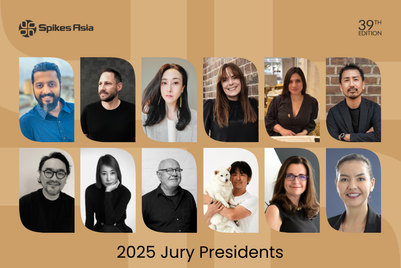
Judging at the Cannes Lions is hard enough. Not only must you pore through hundreds of entries, defend your choices to fellow jurists who are all highly impassioned creatives and leaders in their fields, but your ultimate choices that make or break careers will be scrutinized to death by industry insiders.
Normally jurists can look to the body of work laid out in previous years as a benchmark, but those pioneering new categories have no such luxury.
“A lot of the opening conversation is defining what exactly this award means. What are we looking for?” noted Mark D’Arcy, global chief creative officer of Facebook Creative Shop who presided over the social & influencer category.
“When it’s a new category you’re spending six days intensely debating the questions we ask every day: What is social? What is influencer? What is success? How do we measure success?” D’Arcy told Campaign. “You develop it as you’re talking. The work shapes your thinking.
Minah Kim, director of user experience at Cheil Worldwide a juror in the inaugural creative ecommerce category told Campaign the jury was keenly aware it would be shaping the category for the future.
Nick Law, chief creative officer at Publicis, who was jury president, initially talked about the importance of the new category in a slow-growth economy, Kim said, where ecommerce was set to play a strong role in the future and creativity could be the fuel to allow clients to grow and engage with customers.
The great debates
The aim for creative ecommerce was then to find a balance between business and creativity, but Kim concedes it wasn’t easy, especially between the varied perspectives of creatives and ecommerce specialists and all the diverse backgrounds on the jury.
There was division over the ‘Making the List’ campaign for Lego by Che Proximity in Melbourne which ended up winning a Bronze Lion, which Kim said was strongly supported by moms on the jury.
Kim herself, a UX specialist, said she fought, not always successfully, to keep accessibility on the jury’s radar. “Accessibility doesn’t look as beautiful as other forms of creativity,” she mused.
“There was a huge amount of debate,” D’Arcy said of the social & influencer category, which he characterized as healthy.
Spotlight on Effectiveness
But there were also external pressures. Earlier in the week Unilever’s chief marketing officer Keith Weed took aim at the influencer industry pledging not to work with KOLs who inflated their reach by buying followers.
D’Arcy agreed effectiveness among influencers was a “hugely important” issue and the Social and Influencer jury debated the levels of measurable impact.
“There were a lot of videos showing results with huge numbers and we wondered where they got the numbers from,” said Kim.
In the end, effectiveness had to be just one component, D’Arcy said. “It’s not the only component because we’re a creative festival”
In the end, D’Arcy said, the stuff that was the very best “has a sense of overwhelming service to the people that they wanted to matter to.”
How Asia fared
In the end, few Asia-Pacific entries made the cut in the Social & Influencer category, with only New Zealand Police grabbing a silver for ‘The World’s Most Successful Recruitment Video’ and Air New Zealand and Foxtel in Australia picking up bronzes.
But India’s Paytm ‘Sweet Change’ campaign had a strong showing in Creative Ecommerce, grabbing a gold and silver for McCann India in Mumbai for its campaign that turned the practice of substituting candies for small currency change in India into a way of signing more consumers up for cashless payments.
Kim felt that work in the category could have been stronger than it was. However, the Paytm campaign had a bigger aim than just selling a product and was most deserving, despite the Grand Prix going to Microsoft and McCann for the’Xbox Design Lab Originals: the Franchise Model’.


.jpg&h=334&w=500&q=100&v=20250320&c=1)
.jpg&h=334&w=500&q=100&v=20250320&c=1)
.jpg&h=334&w=500&q=100&v=20250320&c=1)



.png&h=334&w=500&q=100&v=20250320&c=1)

.png&h=334&w=500&q=100&v=20250320&c=1)








